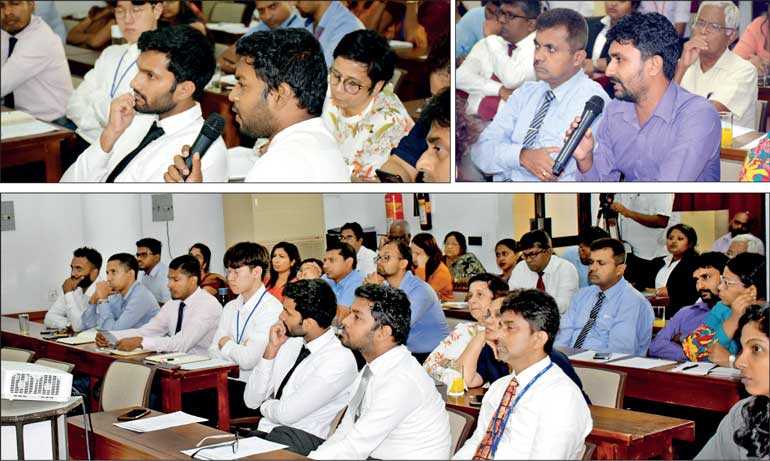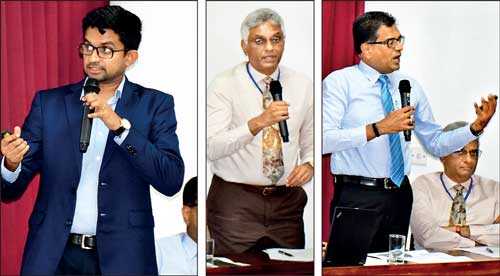Thursday Feb 26, 2026
Thursday Feb 26, 2026
Monday, 24 February 2020 01:13 - - {{hitsCtrl.values.hits}}


For mobilising domestic investment for the Sustainable Development Goals (SDGs), the Government needs to develop different schemes of blended finance, non-state budget investment financing, and collaborative financing schemes. For such a mix of investment to be attracted, ‘the ease of doing business’ in Sri Lanka needs to be improved significantly and policy consistency is an imperative. 
The above was the main message delivered at the ‘Private Sector Consultation on mobilising Domestic Investments for SDGs’ that was held on 17 February at the Ceylon Chamber of Commerce premises. Over 35 private sector representatives from banking, telecom, garments, agro industries, construction, food and beverage, leisure and manufacturing attended the program, which was jointly organised by the Ceylon Chamber of Commerce, Janathakshan GTE and the Centre for Environment and Development. The consultation was a part the ‘GIZ 2030 Agenda Transformation Fund’ supported program towards building transformational capacities to facilitate private sector and subnational governments to align their investments towards the SDG agenda.
Centre for Environment and Development (CED) Executive Director Uchitha de Zoysa made the lead presentation providing an update on the current status of financing SDGs at global level and an overview of Sri Lanka’s preparedness of implementing the global agenda. “Sri Lanka is yet to sort-out policy incoherence and the deeply fragmented public institutional structure which acts as a barrier towards mainstreaming the SDGs into its policy frameworks. After four years since agreeing to implement the SDGs, Sri Lanka is yet to localise the indicators and establish transformational baselines.” de Zoysa pointed out that Sri Lankan authorities have not developed an integrated domestic financing strategy for Sri Lanka and invited the private sector to partner the initiative towards Strengthening the Mobilisation of Private and Sub-National Domestic Investments in Sri Lanka for the 2030 Agenda.
The private sector speakers including Aitken Spence PLC Director Dr. Rohan Fernando, Vidullanka PLC Director Rizvi Zaheed, and Ceylon Chamber of Commerce Chief Economist Shiran Fernando, highlighted that the country needs to mobilise a wide range of financing resources, ensure institutional and policy reforms, conduct coherent planning and implementation towards prioritisation and timely delivery of the SDGs by 2030. Whilst the private sector is ready for aligning SDGs, the challenge is the mixed signals and lack of transparency from the government in terms of policy direction.
A case in point was brought on about the construction sector where incentives are given in on the one hand and then a few months later, heavy taxes imposed leading to non-viability of the sector. Dr. Fernando commenting on the scenario, said, “Whilst it is easy to say that the private sector is the engine of growth, in reality the Government does not facilitate supply of fuel required to run the engine.”
Zaheed reiterated that the opportunities for Sri Lanka in the agricultural sector is enormous, but the need is to modernise, mechanise and make use of developments in the ICT sector to improve the agriculture productivity. The panel discussion was moderated by Janathakshan GTE CEO Ranga Pallewala.
In conclusion Ceylon Chamber of Commerce Senior Assistant Secretary General Chandrarathna Vithanage, drew attention to the fact that even though there is an urgent need for the world to mobilise capital in the direction of achieving the SDGs, the investment landscape shows a large gap between the amount of capital invested by the government and development agencies and the vast amount of financing required for achieving the SDGs by 2030.
He extended the fullest cooperation of the private sector towards engaging more proactively towards mobilising domestic investment for SDGs in Sri Lanka.